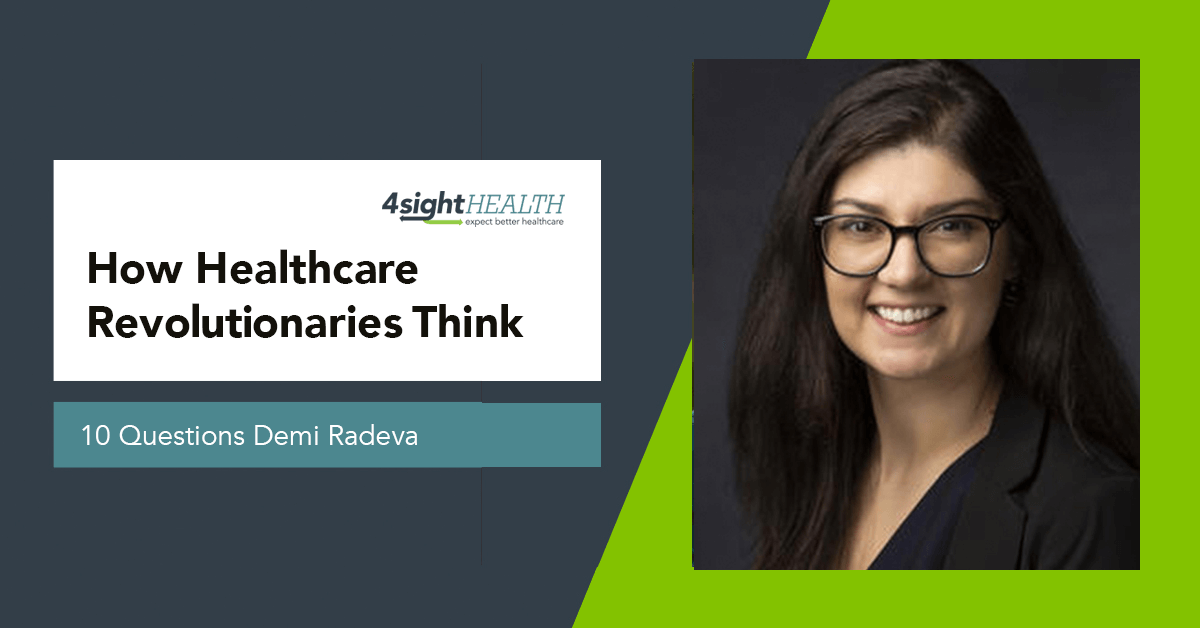June 27, 2023

How Healthcare Revolutionaries Think: 10 Questions With Demi Radeva
Welcome to the latest installment of 4sight Health’s series, How Healthcare Revolutionaries Think. Our interview series profiles healthcare instigators who believe that outcomes matter, customers count and value rules.
Everyone needs help. Even when they think don’t need it. Especially when they say they don’t need it. And they don’t only need help after a crisis. Many need it on an ongoing basis when they suffer from a chronic disease. It’s the connection that makes the difference, especially when that connection is with community support groups and social services organizations that offer help for non-medical needs like food, shelter, clothing, transportation and other social determinants of health.
In Delmira Radeva’s case, it was a hair dryer when a fire destroyed her family’s home when she was a teenager shortly after her family emigrated to the U.S. from her native Bulgaria. Her experiences as an immigrant and as someone who needed help from community groups and social service organizations shaped how she views healthcare in the U.S. and why it needs to change.
Delmira, or Demi, is the chief strategy and operations officer at XanthosHealth, chief strategist for Akros Advisory Services and an adjunct faculty member at the University of Minnesota, where she lectures on health policy and reimbursement.
I spoke to Radeva about the power of connection, what other countries don’t get about U.S. healthcare and what kind of employee she is.
You can also listen to a podcast interview with Radeva on why she never reveals her age and why that’s an important lesson for up-and-coming healthcare entrepreneurs.
1. Demi, give us your definition of a healthcare revolutionary.
Radeva: A healthcare revolutionary is someone who radically changes the system and implements a new one. It’s not incremental innovation in which you’re simply changing something or an aspect of something. We’re talking about replacing the old with the new. With a completely new way of doing things in healthcare.
In the life of everyone, there are obstacles in the way of achieving their dreams. In the life of every entrepreneur, professional and revolutionary, there are obstacles to achieve their vision. The world is what it is, and we are what we are. Everyone needs to find their formula for success given the interplay of those two aspects because we can’t do anything in isolation. We need the collective to be able to accomplish remarkable things and be revolutionary.
2. Do you have a favorite healthcare revolutionary, past or present?
Radeva: I do. A few years ago, I started teaching at the University of Minnesota’s Medical Industry Leadership Institute. In my course, I talk about Florence Nightingale. Everyone knows her as the founder of modern nursing. One of the things that most people don’t know about her was her use of statistical analysis. She first started using statistical analysis during the Crimean War when she plotted incidents of preventable deaths in soldiers who were fighting. She revolutionized the idea that you could objectively measure social phenomena and subject it to mathematical analysis. In that way, she revolutionized how medicine could be done and how we could measure health.
She’s my favorite for a few reasons. First, most Victorian women of her age didn’t attend universities or pursue professional careers. She challenged the norm just with her presence. And to my understanding, her dad was incredibly supportive of young people, regardless of gender, to get a degree. Second, she took statistical data and represented them graphically. I don’t know if she was the first, but in my mind, she’s one of the first to do that. For someone like me who’s a visual learner, this has been helpful as I’ve gone through my education. Or when I try to explain concepts to others. Being able to visualize what’s going on in the data can be really powerful. Third, I would say that she was just committed to helping people, whether that was through being a nurse or through using statistics, that was her mission. She just wanted to save lives.
3. It’s great to hear you talk about statistics. My two oldest got their bachelor’s degrees in statistics from the University of Minnesota. I haven’t been able to help them with their homework for years.
Radeva: It’s a tough field. But I think it’s really fun, actually. I used to read statistics books for fun. One of my favorites is called The Flaw of Averages by Sam Savage, who’s a Stanford professor. I recommend the book. It’s great for businesspeople and healthcare entrepreneurs.
4. OK, I read Mad magazine for fun. Good for you. That’s why no one has ever asked me if I thought I was a healthcare revolutionary. So, I’ll ask you. Do you consider yourself a healthcare revolutionary?
 Radeva: Not yet. But I’m working on something that has the potential to be revolutionary. I’m the co-founder of XanthosHealth, which is a social care referral platform. Our grand vision is to be the bridge that carries the underserved and the chronically ill to health through the most appropriate community support. Our current focus is on oncology patients.
Radeva: Not yet. But I’m working on something that has the potential to be revolutionary. I’m the co-founder of XanthosHealth, which is a social care referral platform. Our grand vision is to be the bridge that carries the underserved and the chronically ill to health through the most appropriate community support. Our current focus is on oncology patients.
5. This idea of health being dependent on connection, not just with your clinician, but with community groups, clearly comes from your experience after you emigrated to the U.S. with your family and how community groups helped you. When did you connect the dots between social determinants of health and health outcomes? Did you see that happen? Do you see cancer patients who didn’t have access to these groups not do as well? Where does that thinking come from?
Radeva: It comes from a few places. One, it comes from my lived experience. I remember our house fire like it was yesterday. My family and I suddenly were homeless. Someone at one of the many community groups that helped us out said, “What do you need?” I remember being like, “Oh my gosh, I don’t know if I should say this right now.” But I said, “I need a hair dryer because it got burned up in the fire.” I was a teenage girl with wet hair. That’s what I needed. For a person to be asked what they need, regardless of what they need, is critical to healing. Creating the same opportunity for patients to express their social needs in their moments of crisis is really important.
It also comes from my conversations with doctors. One of the chief medical officers who I used to work closely with treated a lot of diabetic patients for many years. She said she used to tell her patients, “If I prescribe a treatment, and you’re not adhering to that treatment, it’s my fault. I need to figure out what is preventing you from benefiting from that treatment so that I can give you another approach that will work for you.” For example, the initial approach may be prescribing certain foods and trying to change their nutrition. But for others, that’s not an option. So, you need to prescribe certain medications. “But wait a minute, you can’t afford the medications?” she said she would ask. “Then let’s work together to figure out how to get you the financial help you need to afford them.” That stuck with me. We need to help doctors figure out the best ways to help patients and identify the social conditions that stop their patients from getting the help they need.
6. We’re talking about equity, and we’re talking about physicians. Some advocates want to add both to the initial Triple Aim of improving population health, improving the experience of patient care and lowering the per capita cost of care. They want to add improving health equity and improving clinician well-being as fourth and fifth aims. What are your thoughts on that? Should they be separate pillars? Or should they be rolled up into the original three aims?
Radeva: Wow, what a great question. I’m in support of simplicity. Simple is great. In reality, nothing is simple, especially in healthcare. And when simplicity gets in the way of or produces adverse outcomes in some way, shape or form, we must be explicit about how we want to change the definition of what we want to do. When we say we want to deliver a better patient experience, improve population health and lower costs, are we doing it at the expense of physician well-being? Are we doing it at the expense of delivering equitable patient care? We need to be explicit and expand the original Triple Aim for two goals — health equity and physician well-being — that are critically important for us to accomplish.
7. In addition to working at XanthosHealth, you’re also the chief strategist at Akros Advisory Services, which helps healthcare startups get off the ground. What’s the best idea that you’ve seen that never went anywhere? That failed. You saw someone present it, and you said, “Wow! This is really going to disrupt healthcare.” But then boom. Nothing happened.
Radeva: I don’t believe in the word “failure.” I believe in “lessons learned” instead. At the top of my list of lessons learned would be Medicare for All. It’s an incredibly disruptive idea — everyone is eligible for Medicare. You don’t have to wait until you’re 65. That would have disrupted healthcare as we know it. But it didn’t work for a variety of reasons. One big reason it didn’t work was all these other similar-sounding ideas started popping that were variations of the original. Medicare buy-in. Medicaid buy-in. Medicare for America. Lower the eligibility age to 55. Everyone was pitching their own version of Medicare for All to appeal to more people or to different people. It completely diluted the message. That’s one of the big reasons Medicare for All didn’t move forward. Lesson learned.
Everyone should iterate and find what works for them. Don’t get discouraged. Rather, make everything a fun experiment and see what works. What helps you advance? What holds you back? Take those insights and apply them to help you in your journey to grow and evolve and become a revolutionary.
8. Let’s pick up on that. You’re from Bulgaria. You got your master’s in international health policy at the London School of Economics. You’re obviously familiar with healthcare systems in other countries. Given our mediocre performance here in relation to how much we spend on healthcare, what do other countries get about healthcare that we don’t get here in the U.S.?
Radeva: There are so many countries around the world in which medical bankruptcy, as a concept, does not exist. In the U.S., it just doesn’t exist, but it’s become popular. Not popular like it’s something everyone wants to do. But popular as a storyline or plot in books, movies, plays and on television. In the show Good Girls, the daughter of one of the main characters is sick, and the family goes into bankruptcy as they try to figure out how to survive financially and pay their daughter’s healthcare bills. That’s not a choice anyone should ever have to make. But it’s widely accepted here. That to me is mind-boggling.
That’s not an accepted part of the culture in other countries. People here say, “Free healthcare? That’s socialism.” It’s not free. Someone has to pay for it. The difference is how they pay. There are a variety of mechanisms through which you can collect the money, a variety of mechanisms through which you can distribute the money and a variety of mechanisms to deliver the care. Either way, no one forgoes care because of the cost, and no one goes into bankruptcy because of the cost of care. Healthcare systems are designed to produce the results that they were designed to produce without fail.
9. You worked at UnitedHealthcare and Optum, which is part of United, of course. What did that experience teach you about healthcare system design, financial incentives and outcomes?
Radeva: It confirmed and reinforced what I had studied, what I thought and what I experienced about financial incentives and outcomes. You get the results you pay for.
That is the main reason I teach. I try to educate the future generation of healthcare leaders so that we collectively can make an even bigger impact than I could ever accomplish on my own. This is the reason I decided to work in health insurance. I wanted to be able to make an impact at scale versus only one patient at a time.
10. You’re educated. You’re smart. You’re accomplished. You’re direct. All at an early age. Some might say you’re an overachiever. What type of employee are you in a corporate setting like a United or like an Optum? Are you someone who’s always raising their hand and saying, “I don’t think that’s right,” or are you more tempered in your responses even when you think you’re right?
Radeva: Who am I as an employee? I’d say there’s a reason I’m in the startup world now. I’d say there’s also a reason I was in consultative-type roles as well as strategy and business development roles. I’d say these roles are perfect for people who like to challenge the status quo, push boundaries on what exists, who are not satisfied with what is and believe things can be better, can be more efficient, can be more equitable, can be more affordable for everybody. I feel incredibly lucky that I’ve had these opportunities because they have allowed me to be that devil’s advocate and say, “Well, no. Things can be different.”
The fact that I was the age I was, the fact that I’m a woman, the fact that I am an immigrant, those aspects were actual barriers for me at certain points in time and in certain situations. But I didn’t let that stop me from continuing on to achieve my dreams and find the opportunities, people and environments that saw those aspects of me as valuable and, therefore, support me in planting the seeds of change that I want to see in the world and help advance the collective well-being.
Burda’s Final Bit
I’ve managed people at two different positions in my career, and I’ve managed people like Demi Radeva. They are smarter than you. They question the status quo. They question every decision you make. They do it every day. They never take their foot off the gas. But even though they made my blood pressure go up, they made me a better manager by challenging everything I did. They made our publications better by challenging everything we did. I complained about it once to an old friend and colleague of mine, the late Emily Friedman, who was Radeva’s equal in her day. Emily told me it’s the troublemakers who make the healthcare system better for everyone. Emily was right. And I have no doubt Radeva is right.
Demi Radeva is a healthcare policy and economics professional responsible for directing strategic planning efforts across large payers. Currently, Demi leads the enterprise Health Equity Strategy for the Community and State line of business at UnitedHealthcare. In her previous roles, Demi has enabled successful enterprise pandemic response. She created the first-ever Enterprise Nutrition Strategy and founded a leadership roundtable on nutrition which led to a spur in innovative benefits for employees and health plan members nationwide. She is a co-founder of OASIS – an employee resource group aimed at creating a safe space for Optum Consulting business associates of all backgrounds and she laid the foundation to the Optum Equity Office. Demi has experience in healthcare management consulting and corporate and investment finance, specifically, strategic merger and acquisition valuation, organizational change management, health plan quality improvement and provider restructuring. Outside of work, Demi is the founder of the Global Ambassador Network for Digital Health Today. Additionally, she is an active community member and volunteer on a mission to eradicate childhood hunger and prevent chronic diet-related disease.
XanthosHealth is a transformative social care connection platform that connects clinical teams, and community-based organizations with people living with cancer who are struggling to meet their daily needs such as food, shelter, and general community support.
Read more Healthcare Revolutionary interviews
- May 2023: Michael Pitt, M.D.
- April 2023: Rebeckah Orton
- February 2023: Dan Trigub
- January 2023: Melina Davis
- December 2022: Bruce Brandes
- November 2022: Lena Chaihorsky
- See the full series here.




